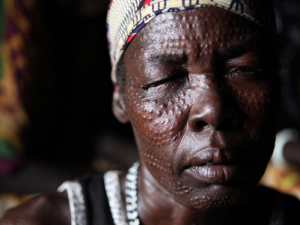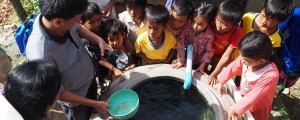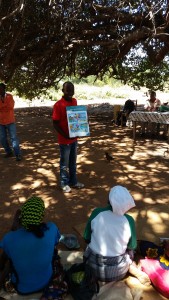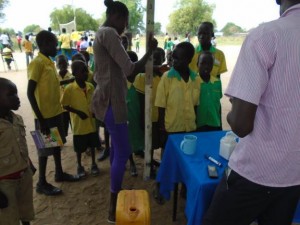Five years later, five years closer
30 January 2017Five moments fighting neglected tropical diseases
On 30 January 2012, leaders in global health and development met in London to pledge their support for the World Health Organization’s ambitious plan to control, eradicate or eliminate all 17 NTDs by 2020. This commitment resulted in the London Declaration on NTDs and the formation of the coalition Uniting to Combat NTDs.
Through collaboration, data sharing and aligned strategies, the coalition has extended and expanded NTD programmes into what is now the largest public health initiative in the world. This has contributed to a 20 percent increase in NTD treatments globally, an additional seven million people receiving treatment for trachoma and 16 million more people receiving treatment for river blindness since 2013. The coalition has also supported the development of mapping tools which improve our ability to target NTDs and reach those who need it most.
Mass drug administration to prevent trachoma in South Sudan

Trachoma is a contagious, but preventable, bacterial infection of the eye, which can cause permanent blindness. In Mayom County, South Sudan, Malaria Consortium trained 600 community drug distributors to conduct a mass drug administration programme in the fight against trachoma. The programme gave preventive treatment to Mayom County’s entire population of 123,760 people, including 5,720 infants aged less than six months, 31,690 children aged six months to five years and 86,401 children over five years and adults.
Integrated vector management to prevent dengue in Cambodia

Dengue fever is a growing health issue around the world. Since 1960 case incidence has risen from 15,000 cases per year to over 390 million in 2016. To combat the spread of dengue-carrying mosquitoes Malaria Consortium piloted the Dengue Integrated Vector Management project in Kampong Cham province, Cambodia, where the disease is endemic.
The innovative project introduced larvae-eating guppy fish in large village water tanks, larvicide in smaller water containers, and used behaviour change communications strategies to reduce dengue-carrying mosquito populations. Malaria Consortium’s one-year pilot helped reduce the rate of potentially dengue-carrying mosquitoes by 46 percent. Communities found the intervention to be acceptable both in cost and convenience, making it a suitable intervention for scale-up.
Community dialogues to increase knowledge of NTDs in Mozambique

NTDs constitute a serious obstacle to socio-economic development and reducing poverty. In Mozambique, NTD rates are extremely high. Mass treatment campaigns have been implemented in recent years, however a lack of community-based health programmes and social mobilisation strategies are among the obstacles in preventing and eradicating or eliminating NTDs in Mozambique.
To strengthen community engagement, Malaria Consortium is implementing a community dialogue approach. Malaria Consortium trained community members to act as community dialogue facilitators in their own communities. This provided a platform for community members to share information, develop skills and gain control over decisions concerning their health, particularly in regard to NTDs such as lymphatic filariasis and schistosomiasis.
The programme was found to be successful in improving knowledge of how NTDs affect health at the community level and increasing the adoption of preventive practices, such as improved sanitation.
Drug distribution for schistosomiasis and soil transmitted helminth infections in Central Equatoria

Central Equatoria, South Sudan, is endemic for soil transmitted helminth infections and schistosomiasis, however deworming campaigns have not been systematic and have had limited impact. In 2016, Malaria Consortium supported the Ministry of Health to provide deworming drugs to school aged children across Central Equatoria through specified drug distribution sites as well as through primary schools.
Malaria Consortium developed training materials for community drug distributors. This included information about the life cycle of worm infections, signs and symptoms, preventive measures, the importance of deworming, and guidance on how to provide treatment, record treatment, monitor for side effects, and answer community questions.
In total, the project trained 1,419 community drug distributors who provided over 800,000 treatments at drug distribution sites. The project showed that the distribution sites approach was effective, feasible, acceptable to the community, and achievable within a short time period – each distribution site was in place for just one week.
We look forward to continuing our partnership with the Uniting to Combat NTDs coalition and helping to eliminate NTDs all over the world.
Latest news
- International summit calls for AMR accountability in public health interventions21st March 2024
- Global SMC community celebrates new milestone at SMC Alliance Annual Meeting in Nigeria6th March 2024
- Scaling up key interventions could halve pneumonia-related childhood mortality13th February 2024
- Malaria Consortium and eGov Foundation join Mozambique’s national malaria programme to digitalise seasonal malaria chemoprevention campaigns8th February 2024
- World’s first malaria vaccine rollout launched in Cameroon22nd January 2024
- Digital solutions driving equitable access to health6th December 2023